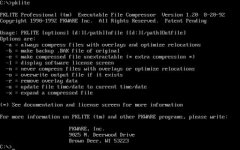Trixter
Veteran Member
I meant pklite, and what you're seeing is definitely not normal:

I would find another source for pklite 1.2x and download it. Here is one such source: ftp://ftp.oldskool.org/pub/misc/xtfiles.rar
I would find another source for pklite 1.2x and download it. Here is one such source: ftp://ftp.oldskool.org/pub/misc/xtfiles.rar


